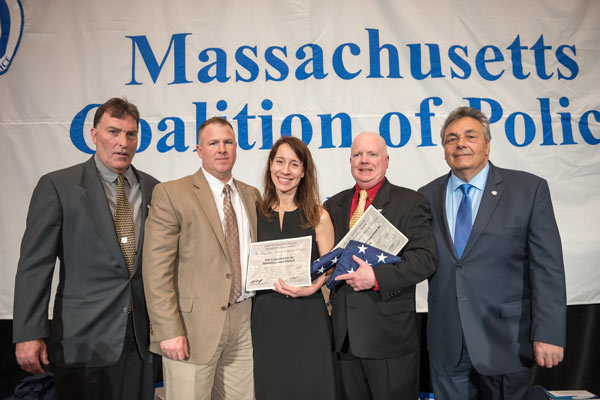On February 22, 2016, Arbitrator Marc Greenbaum issued an injury leave award in favor of Mass Coaltion of Police and Rehoboth Police Lt. Bruce Dube. A copy of the Award is attached. Mass COPs case was presented and argued by Sandulli Grace Attorney Amy Laura Davidson.
The case involved a reoccurrence and exacerbation of a previous injury that Lt. Dube had suffered in a cruiser accident in 1990. The accident damaged one of his cranial nerves causing him to have double vision. He was able to compensate for it for many years by tilting his head or blinking. Last December, Bruce’s condition deteriorated and he was no longer able to compensate for the double vision.
Lt. Dube had 27 years of unblemished service. He rose through the ranks to Lieutenant. The medical evidence that his condition was work related was uncontroverted. Even the Town’s doctor found that to be the case. Although the Chief originally placed Bruce on IOD, he reversed that decision and deducted his sick leave back to February 2015. The Town dragged its feet causing Lt. Dube to run out of all of his accumulated sick and vacation time. He went off the payroll in early December 2015 and remained so until the Award issued.
Arbitrator Greenbaum issued his award in under two weeks. He found that the Town violated the contract by failing to place Lt. Dube on injured on duty leave. He also held that the Town violated the contract by switching Bruce’s shift assignment to the day shift while he was incapacitated resulting in a loss of @ $95/week. Arbitrator Greenbaum issued a make whole order requiring the Town to restore all the accumulated time that Bruce was forced to use, compensate him for back pay and place him on IOD status going forward.
The parties are currently engaged in discussions about the damages owed under the Award. The amount owed is in excess of $50,000. In addition, the Town has agreed to reimburse Lt Dube nearly $9,000 for the taxes that were unlawfully withheld from his pay while he was incapacitated.
Read the arbitrator’s award.




